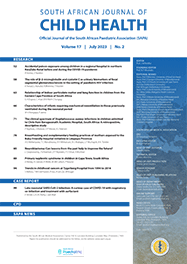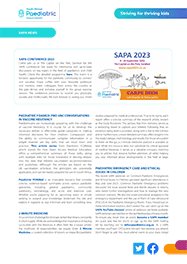Research

Barriers, facilitators and recommendations for the early infant diagnosis and treatment (EIDT) cascade: A qualitative study in Malawi
Abstract
Background. Identifying and testing all HIV-exposed infants (HEIs) by 2 months of age with rapid antiretroviral therapy (ART) initiation for those infected is critical to survival. Yet in 2009 only 29% of HEIs in need of ART received treatment in Malawi.
Objectives. To understand barriers, facilitators and recommendations for five key steps in the early infant diagnosis and treatment (EIDT) cascade: (1) identification of HEIs; (2) infant testing; (3) sample processing and transport; (4) reporting results to mothers; (5) ART initiation for HEI.
Methods. Semistructured interviews were conducted through convenience sampling with mothers of infants eligible for EIDT (n=47) and with healthcare workers (HCWs) providing EIDT (n=20) in five facilities, in April 2013.
Results. (1) Reliance on the health passport to identify HEIs is both barrier, as women may not attend appointments with their passports, and facilitator, for documentation of HIV-exposure status. Use of trained health surveillance assistants in EIDT enhances cascade steps 1 and 2, but requires increased supervision. (2) Women struggle to accept their own HIV status, yet test results for an HEI is a motivator. Sensitisation through local leadership facilitates EIDT. (3) A reliable transport system is needed. (4) Maintaining appointments to report results to women motivates them. (5) Mothers were reluctant to give ART to young, apparently healthy infants.
Conclusion. Both women and healthcare workers are motivated by test results for HEIs. The inclusion of community education can improve all steps in the EIDT cascade, including information that HEIs need ART.
Authors' affiliations
Emily A Bobrow, Elizabeth Glaser Pediatric AIDS Foundation, Washington DC, USA
Aida G Yemaneberhan, Elizabeth Glaser Pediatric AIDS Foundation, Lilongwe, Malawi
Mafayo Phiri, Elizabeth Glaser Pediatric AIDS Foundation, Lilongwe, Malawi
Leila Katirayi, Elizabeth Glaser Pediatric AIDS Foundation, Washington DC, USA
Allan Ahimbisibwe, Elizabeth Glaser Pediatric AIDS Foundation, Lilongwe, Malawi
Frank Chimbwandira, Ministry of Health, Lilongwe, Malawi
Nicole Buono, Elizabeth Glaser Pediatric AIDS Foundation, Lilongwe, Malawi
Full Text
Cite this article
Article History
Date published: 2016-06-29
Article Views
Full text views: 1751

.jpg)



Comments on this article
*Read our policy for posting comments here